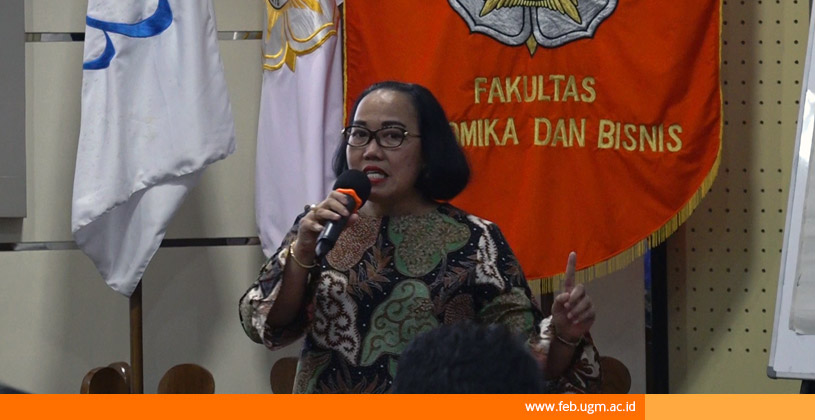Impact of the Adoption of PSAK 71, 72, and 73
- Details
- Written by Leila
- Category: News
- Hits: 2211

On Friday (8/11), the Faculty of Economics and Business Universitas Gadjah Mada (FEB UGM) held a public lecture on the adoption of PSAK 71.72, and 73 in the construction industry. Located in the Learning Center Auditorium of FEB UGM, the event took Ms. Inggir Elerida Lumban Taruan as Senior Vice President Accounting Division at PT Waskita Karya Persero Tbk as the speaker. This event is one of the responses to the discourse of the adoption of a new Statement of Financial Accounting Standards (PSAK) which adopted the International Financial Reporting Standards (IFRS) on 1 January 2020.
In his remarks, Eko Suwardi, M.Sc., Ph.D as the Dean of FEB UGM said that the topic was very relevant to be discussed. "Theoretically, it has been studied, what remains is the practice and interpretation. This proves that the discipline of accounting does not only imitate but must have a broad perspective," he said. The event was moderated by Singgih Wijayana, S.E., M.Sc., Ph.D. as the Chair of Undergraduate Program in Accounting who also serves as a member of the Indonesian Institute of Accountants Financial Accounting Standards Board (DSAK IAI).
This program explores the impact of the adoption of the PSAK. The adoption of PSAK 72 regarding Revenues from Customer Contracts will have significant implications for the real estate industry. This is because the recognition of income which was initially made possible when there is a down payment and meets certain criteria, with the adoption of new standards can only be recognize when all work has been completed.
PSAK 73 which regulates Leasing highlights the subject of capital leases. In the previous PSAK, capital leases which have a buy back option will be recorded in the financial statements and expenses will be considered as amortization expenses. With the adoption of the new PSAK, it does not consider whether there is a buy back option or not, it will still be recognized as debt and expense. In addition, the lease must be recognized on balance because the control lies with the leassee. The industries that are likely to be significantly affected are electricity companies, such as PLN. This is because the fixed assets reach 80%, not including rent. The implication, Debt to Equity Ratio (DER) was very high.
PSAK 71 concerning Financial Instruments emphasizes the reduction of receivables using the concept of expected credit loss (ECL). This concept combines various economic scenarios, such as historical, present, and forward looking. ECL is used as an effort to map creditors to the ability to pay of debtors.
Source: Leila Chanifah Z/Soni B


